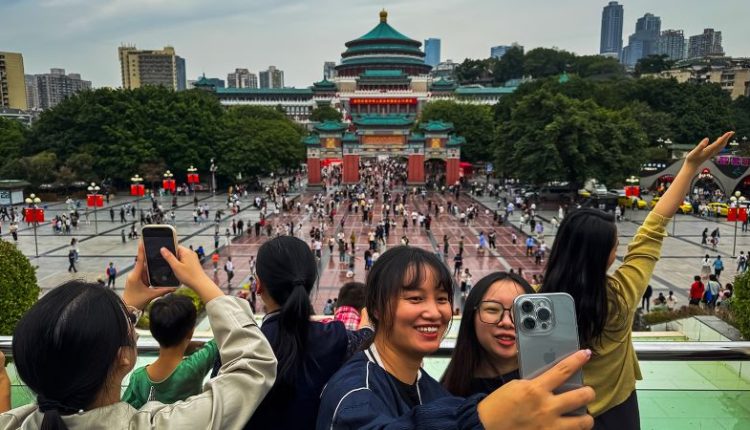Investors went wild for China during its big holiday. But Chinese shoppers showed little of that optimism
Editor’s Note: Sign up for CNN’s Meanwhile in China newsletter which explores what you need to know about the country’s rise and how it impacts the world.
Global investors went wild during China’s just-concluded Golden Week holiday by snapping up “everything” related to the country. But that optimism didn’t extend to shoppers and travelers in the world’s second-largest economy itself.
Goldman Sachs economists wrote in a Tuesday research note that tourism revenue per person was 2.1% below the pre-pandemic level during the National Day Golden Week, a seven-day period that ended on Monday. Weak consumption calls attention to a persistent problem with consumer confidence.
“Low tourism spending per head and subdued services prices highlighted still weak domestic demand and continued consumption downgrading,” they said. “It remains to be seen how much more easing especially — on the fiscal front — will be announced in the coming months and to what degree it may help boost domestic demand (mainly consumption), normalize prices and rebuild confidence.”
Things are so dire that some economists are pressing the government to unleash a major stimulus package worth up to 10 trillion yuan ($1.4 trillion) to restore bullishness in the world’s second-largest economy, which is struggling with a slew of economic problems including falling prices.
Goldman Sachs added that anecdotal evidence indicates hotel prices and airfares during the holiday were lower than year-ago levels. A year and a half after China reopened its borders following the Covid-19 pandemic, consumer confidence is still struggling to recover.
There were some bright spots. According to official data, cross-border travel rose by about 26% to 13 million trips, compared with last year’s holiday period. International flights grew 42% compared with a low base from 2023, according to Citi.
After a slew of weak economic data over the summer prompted concern that China may miss its 5% target growth rate announced in March, leader Xi Jinping finally decided to go ahead with a much-needed stimulus package, mostly focused on monetary measures, in the last week of September.
Share markets soared following the perceived U-turn in government policy. David Tepper, the billionaire founder of American hedge fund Appaloosa Management, told CNBC in an interview on September 26 that he was buying more of “everything” related to China.
But experts say much more needs to be done to revive confidence, which stood near a historic low this summer.
On Wednesday stock markets in Shanghai and Shenzhen saw a sharp reversal of recent gains, while Hong Kong’s benchmark Hang Seng Index tumbled following its best two-week period in nearly two decades. (China-related stocks were in the black on Thursday.)
The falls came after China’s top planning agency, the National Development and Reform Commission, largely held off from announcing a major package of stimulus measures at a Tuesday press conference, which disappointed investors.
Now investors are looking ahead to another highly anticipated press conference scheduled for Saturday with the Ministry of Finance, with investors still holding out hope that more direct stimulus measures will be announced.
Read the full article here

